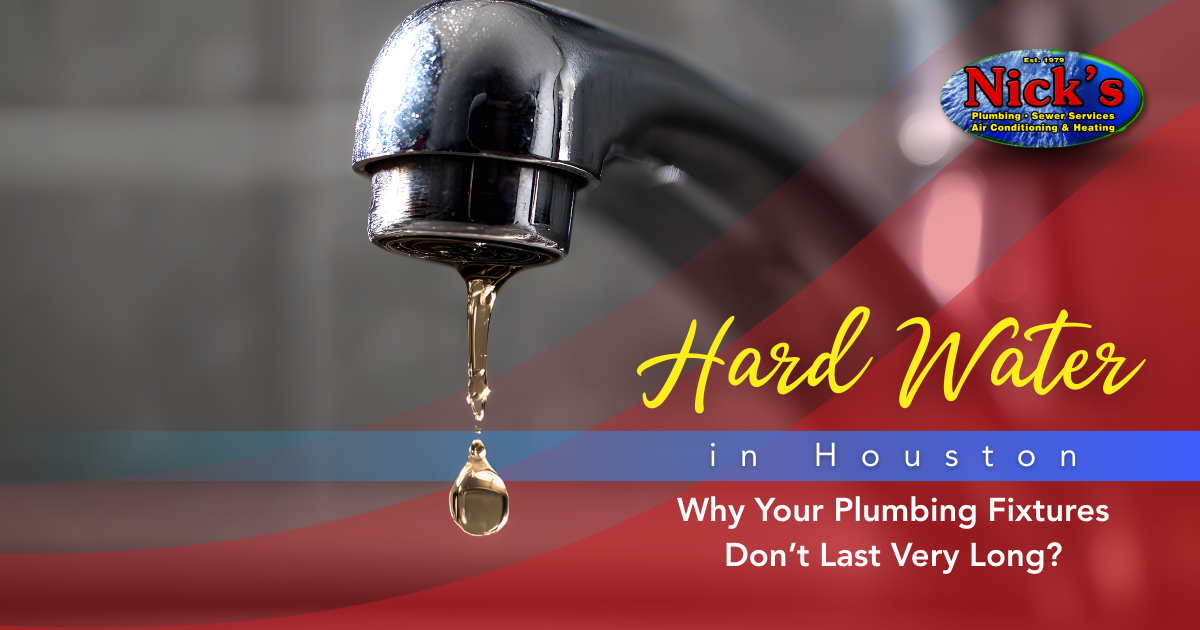If you’ve lived in the Houston area for a while, you have probably noticed a frustrating pattern: faucets don’t stay shiny, showerheads clog up, and water heaters seem to need replacement much sooner than expected. So what gives?
While some of this can be chalked up to age or usage, much of the problem has one root cause — the extremely hard water we have in Houston.
Let’s break down why Houston homes struggle with hard water, how it affects your plumbing fixtures, and what you can do to protect your system from long-term damage.
Why Houston Homes Struggle with Hard Water
So, does Houston have hard water? The answer is yes. Our city’s water supply comes from a mix of surface water (like lakes and reservoirs) and groundwater, both of which carry dissolved minerals. By the time the water reaches your tap, it often contains high levels of magnesium and especially calcium.
On average, Houston water tests around 7.9–8.0 grains per gallon — that’s considered “moderately hard” to “very hard.” Over time, those minerals don’t just flow through your plumbing. They stick, layer up, and create what most homeowners recognize as the chalky, white buildup around fixtures.
How Hard Water Damages Plumbing Fixtures
The real problem with hard water damage plumbing systems is that the minerals never stop moving through your pipes. They leave behind scale that coats everything it touches — pipes, faucets, showerheads, and even the seals inside your fixtures.
That limescale buildup does more than look bad. It clogs aerators, reduces water pressure, and accelerates fixture wear. Over time, mineral deposits can corrode metal, crack seals, and cause leaks in hard-to-reach areas. That’s why plumbing fixtures in Houston often need to be replaced long before their expected lifespan.
Why Do My Faucets and Showerheads Develop That White Buildup So Fast?
If you’ve noticed your faucet losing its shine or your showerhead sputtering after only a few months, you’re not imagining it. That chalky white crust is limescale, left behind when Houston’s hard water evaporates. The minerals don’t go anywhere — they just stick around. Over time, they accumulate around the edges of faucets, inside aerators, and in the small nozzles of your showerhead. Anywhere water sits or drips regularly is a prime target, which is why the buildup seems to show up faster there than anywhere else.
So, if you’ve ever wondered why faucets corrode quickly or why your showerhead clogs after just a few months, you’re looking at the work of limescale. As water evaporates from those surfaces, the minerals stay behind, leaving a crusty white ring. In areas where water sits (like inside the showerhead or at the tip of a faucet), the buildup happens even faster.
This mineral buildup in faucets doesn’t just make them look bad — it reduces water flow and leaves you scrubbing fixtures far more often than you’d like.
What Is the Best Way to Protect My Fixtures from Hard Water?
Sure, you can scrub the faucet or soak a showerhead in vinegar when the white crust shows up — it’ll shine again for a while. The trouble is that the trick only addresses what you can see. Inside the plumbing, the same minerals are still piling up, narrowing the pipes little by little and making the system work harder than it should.
That’s why many Houston homeowners opt for something more permanent. A water softener or conditioner doesn’t just cover up the problem — it treats the water before it ever gets to your fixtures. When the minerals are dealt with upfront, they can’t stick around to clog showerheads or leave crusty rings on faucets.
So yes, a scrub is fine for a quick win, but if you’re tired of fighting the same battle over and over, the better move is stopping the buildup before it starts.
Benefits of Installing a Water Softener in Houston
Installing a water softener to combat hard water in Houston works by treating the water before it flows into your home, preventing limescale from causing problems.
Homeowners notice the difference almost immediately:
- Fixtures stay cleaner longer without white crusts.
- Water heaters run more efficiently and last longer because heating elements don’t get coated in scale.
- Washing machines and dishwashers avoid the constant mineral buildup that wears out pumps and heating elements.
- Even your skin and hair feel better with softened water, since soap rinses away more easily.
Over the long run, softening your water extends the lifespan of your plumbing system and appliances, saving money on both repairs and replacements.
Stop Replacing Fixtures—Fix the Hard Water Problem
Replacing faucets, showerheads, or even water heaters every few years isn’t normal — it’s a symptom of hard water in Houston. While cleaning and regular maintenance can help, the only real way to protect your plumbing long-term is to treat the water at the source. A water softener or conditioner may be an investment upfront, but it pays off by reducing breakdowns, keeping your fixtures looking new, and helping your appliances run efficiently.
FAQ – Hard Water in Houston
Is hard water safe to drink in Houston?
Yes. Hard water is considered safe for drinking and cooking, though the minerals that make it “hard” are precisely what cause plumbing problems.
How can I tell if my home has hard water?
Look for signs of hard water in plumbing, such as white spots on dishes, clogged showerheads, soap scum that won’t rinse away, or skin that feels dry after showers.
Do I need a water softener or a filtration system?
It depends on what you’re trying to solve. If the big headache is scale — that white, crusty buildup that clogs fixtures and shortens the life of appliances — a softener is the tool for the job because it removes the calcium and magnesium causing the trouble. A filtration system has its benefits, but it won’t prevent limescale from forming on its own. In some Houston homes, the best setup is a combination of both: the softener tackles the minerals, and the filter handles taste, odor, or other water quality issues.
Why Choose Nick’s for Your Hard Water Issues?
Hard water is a fact of life here, but you don’t have to keep dealing with the fallout alone. Nick’s Plumbing has been helping homeowners tackle hard water damage plumbing problems in Houston for decades. Our licensed plumbers know how to identify the early signs of scale buildup, repair fixtures that have been affected, and install water softeners tailored to your home’s needs.
With the proper setup, you’ll spend less time scrubbing white deposits and more time enjoying fixtures that actually last.

























